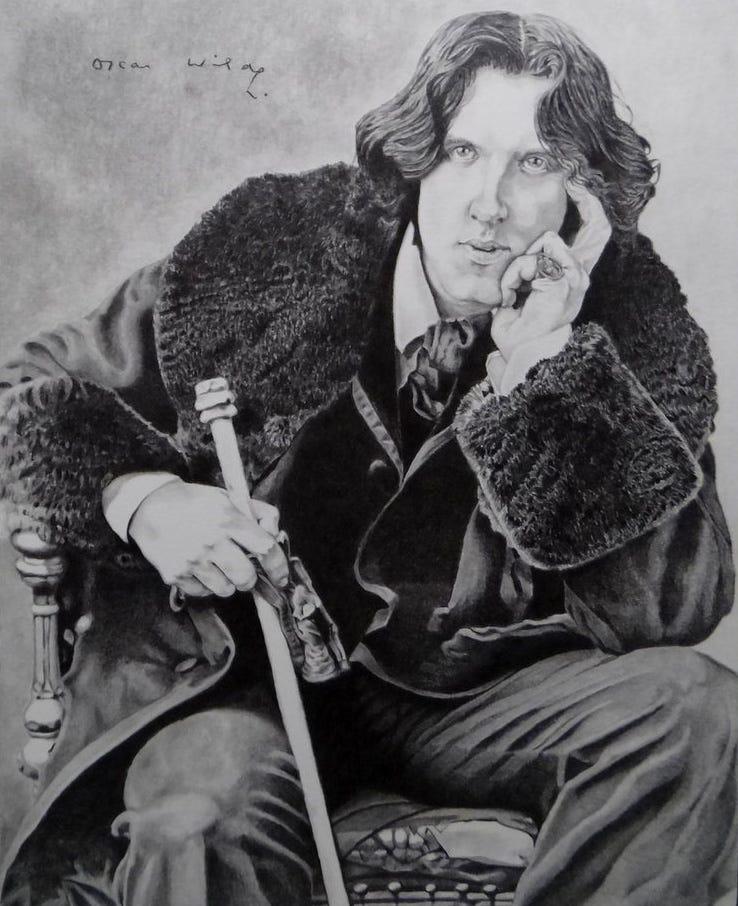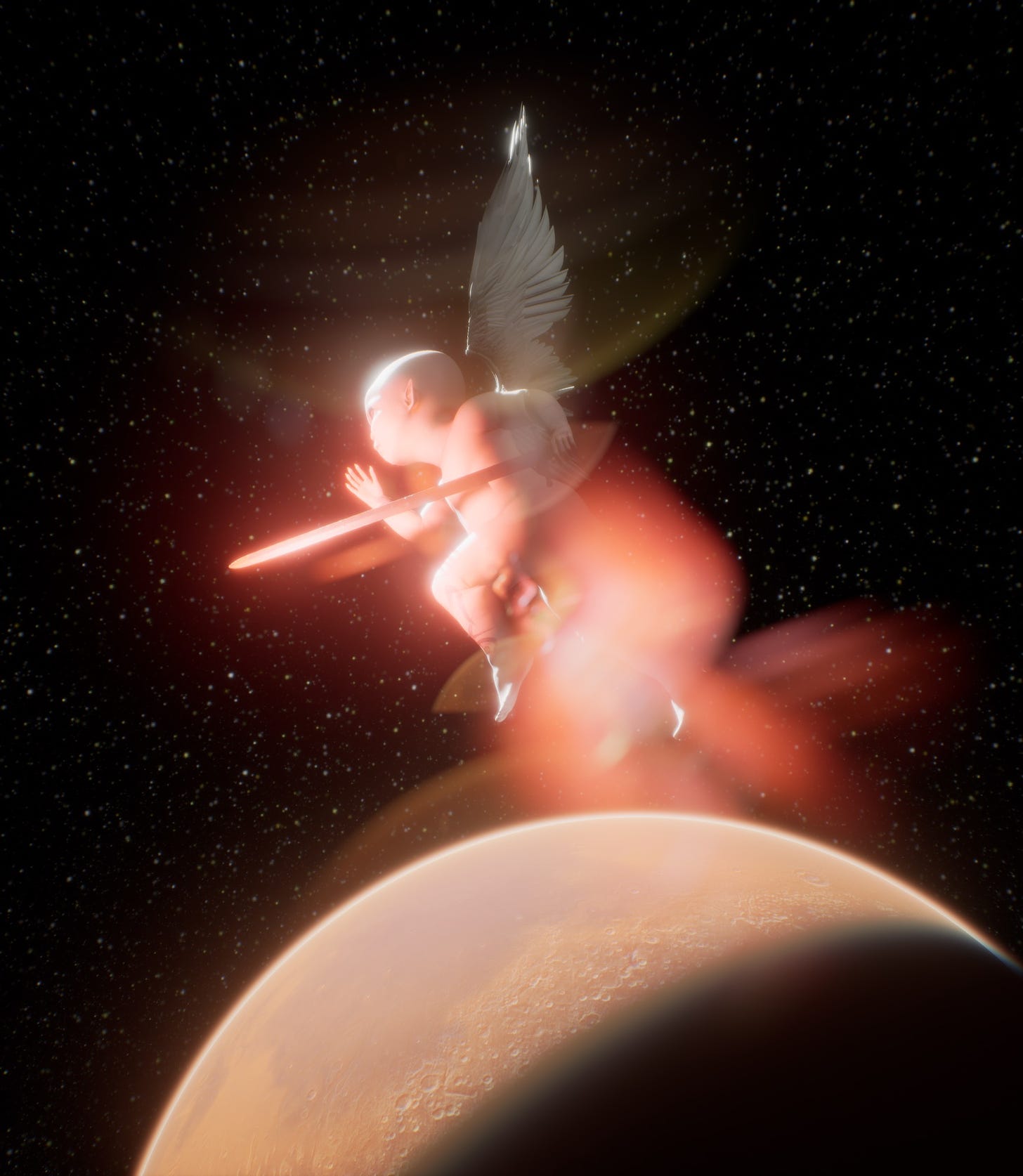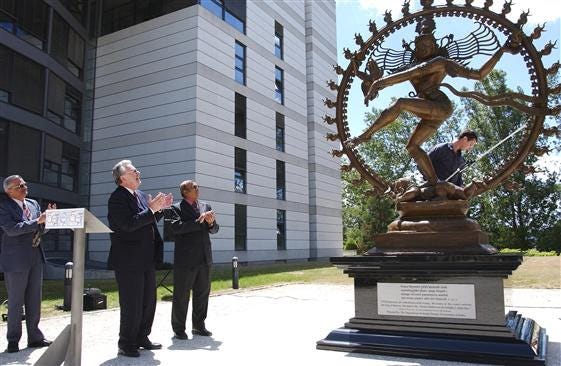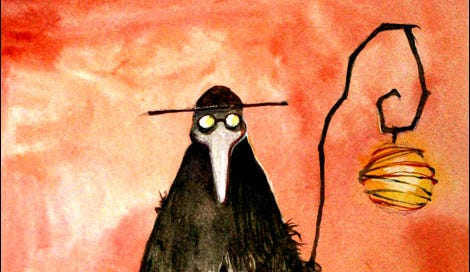
The Intolerability of Salvation
"If I am to continue to be a living human being, someone must come to free me.... This we cannot accept. We do not want grace. Fundamentally what we want is self-justification." - Jacques Ellul
One-time or recurring donations can now be made at Ko-Fi
“Trust in no human means, for God will provide (we cannot say where, when, or how). Have confidence in his Word and not in a rational program. Enter on a way on which you will gradually find answers but with no guaranteed substance. All this is difficult, much more so than recruiting guerillas, instigating terrorism, or stirring up the masses. And this is why the gospel is so intolerable, intolerable to myself as I speak, as I say all this to myself and others, intolerable for readers, who can only shrug their shoulders.” - Jacques Ellul
What I am writing here is truly intolerable. If I wanted to grow my following and get more colorful checks next to my name, proving what a successful ‘influencer’ I am, I should write the opposite.
I should write an article no longer than a “3-to-5-minute read” that talks about a marvelous victory over the enemy. How all the evils of the last three years will be exposed. A grand tribunal will be assembled. Nuremburg trials where the likes of Bill Gates and Anthony Fauci will be imprisoned. Perhaps even dragged through the streets and guillotined in the town square.
But I can’t write that. It would be dishonest of me.
A long time ago, I wrote and illustrated children’s books. Nineteen of them to be exact. They’re all out of print now and I have little time to try and get them back into circulation. Some of them were quite successful, such as The Rumpoles and The Barleys, a picture book series that I wrote and illustrated.
At the time, it increasingly bothered me that writers were being told we had to fit into a certain category and follow a formula. I was even told I needed to “dumb” my writing down for it to be saleable (and believe me, I wasn’t writing like Proust). I doubt C. S. Lewis was thinking about such restrictions when he wrote The Narnia Chronicles. He just wrote it.
A few years ago, I started working on a YA fantasy series, Night Angels Chronicles. A publishing company commissioned me to write six books in the series.
They were ready to publish the first book, Key of Mystery, when the Twilight books came out. Suddenly, everything changed. My books needed to be more like Twilight. I couldn’t stand those books. As far as I was concerned, they were horribly written. The vampires were wimps and so was the heroine. But they were extremely successful, so I should forget that. Girls, and even grown women, loved them. (If you are a fan, I hope you won’t be too offended by my criticism.)
I refused to change my stories to fit the latest trend. I got the rights back and the first three books in the series were published by Evernight Teen, which has since focused more on romance, a better selling genre.
This is the first time I’m talking about my fiction works. I warn my more conservative Christian readers who might want to go out and get these books for your teenage children, the series has vampires and zombies, as well as angels and demons, and all sorts of evil goings on. That’s how the world is (well minus the vampires and zombies, although some might dispute that). It has gay lovers, drugs and violence. That’s how the world is, too. I don’t write for a particular market or to please any particular group of people. I write what is in my soul. The series is about power and the desire to be God, the same themes I write about in my essays, but from an entirely different perspective. Night Angels is the story of a girl named Sera and the choices she must make to find her own salvation. I’m almost finished with the fourth book in the series, Land of Talismans, having gotten sidetracked by these essays! With six books in all, Sera’s journey isn’t short, nor is it obvious, and with each book, that journey grows ever more complex.
Humans consistently deny the deeper meaning of life, preferring the easier and more carnally satisfying, material way. Success means fame and fortune. It can also mean the perfect house in the perfect neighborhood, married to the perfect spouse with the perfect kids. And lots of impressive toys for grown-ups as well as children, as well as the latest technological devices, smart houses and smart cars. The more material possessions one acquires, the greater is the pressure to keep up the appearance of “success” and the more things one must accumulate to prove it.
This meaning of success is so ingrained that even when someone is caught achieving it by notorious and illegal means, they are only shamed because they were found out. We are led along by the examples of clownish politicians and billionaires, overgrown children who strut about, lying through their teeth for the starry-eyed masses. Sam Bankman-Fried has become the perfect poster boy of our times; that the end justifies the means. A multitude of sins can be covered by a mask of virtue. A mask that, in SBF’s case, they are now saying was so flimsy, anyone could have pulled it off, exposing the massive Ponzi scheme underneath. But no one wanted to do that. Too many others were benefiting from the scheme or ones similar to it.
Frankly, just like the exposure of Fauci and Pfizer, along with the media’s lies about the Ukraine war, the exposure of SBF and FTX likely won’t change anything for the better. Oh, it will bring about more restrictions. More government control. More surveillance of our lives by technology. In fact, it will only reenforce the wrong direction we are already going in. Billionaires may rise and fall but the agenda marches on.
Let’s compare the flawed artists of the past with the celebrity mentality of today.
Egon Schiele died of what has come to be known as the Spanish flu, in 1918, at the age of 28, penniless and hungry, in a small Vienna apartment. His pregnant wife had died a few days previously and he spent his last moments drawing her lifeless body.
El Greco, how well I remember as a child standing before his paintings in the Museo del Prado, Madrid. His contorted, elongated figures were nothing like the accepted paintings of the time. What could he have been thinking? If only he’d adhered to the traditional techniques, he would have made a lot of money! He died in obscurity in 1614 and it would take 250 years before the genius of his art was acknowledged.
Oscar Wilde is a prime example of the uncompromising artist. It is said his last words were, “My wallpaper and I are fighting a duel to the death. One or other of us has got to go.” He died alone, bankrupt from paying legal fees for his imprisonment for the crime of being homosexual. The irony is that it was during this time when his works gained in popularity. He didn’t live to enjoy it.
Stieg Larsson is a tragic artist for modern times. The Swedish writer died of a heart attack in 2004 at age 50, only months after completing the manuscripts “The Girl with the Dragon Tattoo,” “The Girl who Played with Fire” and “The Girl who Kicked the Hornet’s Nest.” It was shortly thereafter that the books became international best-sellers. Larsson was a heavy smoker and a dedicated consumer of junk food. If only that elevator hadn’t broken, forcing him to climb all those stairs to his office, maybe he wouldn’t have had that massive heart attack. Maybe he would have lived long enough to enjoy his success.
How would these artists be treated today? Would they be recognized for their genius, or in some cases like that of Larssen, would they have learned their lesson and stopped their unhealthy habits? Certainly not. No doubt, they would have died in just as obscure and poverty-stricken, or tragic ways. Even after death, it’s doubtful many of them would have found success by today’s perverse standards.
What is art now, after all? NFTs? It’s all about ownership.
We have entered the age of the ultimate con, the maximum negation of reality. Getting people to pay for nothing, with fake money. Those billionaire overgrown boys are laughing louder and louder, despite the warnings of SBF’s downfall. His lifestyle still represents the ultimate success.
How about the first disciples who followed Jesus? If Jesus had wanted to be popular, he wouldn’t have said this:
“If anyone desires to come after Me, let him deny himself, and take up his cross, and follow Me.” Matthew 16:24
Jesus died on a cross flanked by criminals, abandoned by his twelve disciples and betrayed by one of them. He was so poor; a tomb was donated by a wealthy man in which to bury him.
Surely this is the antithesis of success. And yet, it is the greatest story ever told. People argue that because similar stories can be found in other cultures down through history, it must not be true. It’s just a copy of something else. But to me, this represents even greater proof of its authenticity. This greatest story ever told is imbedded in our minds, in our hearts, in our histories. In the very consciousness of the universe. The truth of it cannot be denied.
Jesus took all of our sins upon his shoulders, died, overcame death and rose again. He came back physically as much as spiritually, not uploaded into the “cloud.” His wayward followers saw him, they touched his body. Jesus even told a doubting Thomas to put his finger into the sword wound on his side.
You can imagine how terrible Thomas must have felt. Jesus admonished him in John 20:29,
“Thomas, because thou hast seen me, thou hast believed: blessed are they that have not seen, and yet have believed”
Through this experience, the disciples’ lives were completely changed. They turned from cowards into fearless preachers of the gospel. They truly did give up everything. They were tortured and killed for their faith.
Imagine Jesus’s disciples today, proudly boasting that they owned an NFT.
Here’s one you might want to buy, Tweeted about in February of 2021:
The "War Nymph" collection is dropping tomorrow, February 28 @ 2pm EST. Are you ready for this collaboration between @Grimezsz & @MacBoucher1
Who is excited for this drop? Don't forget a % of the proceeds from the #NFT sales will be donated to @carbon_180! (A new breed of climate NGO on a mission to reverse two centuries of carbon emissions.)
Human Instruments put a damper on it by tweeting back:
but nfts create carbon.
Not surprisingly, @Human_Inst’s tweet was ignored and got nary a “like”.
Pastors of big churches tell us that the disciples lived in special times, and we shouldn’t be expected to live like they did. Why not? How did the first Christians live? They shared what they had amongst themselves. They looked after one another. This was necessary. After all, they faced the possibility of persecution and death daily.
Those who are resisting the Vast Machine now find themselves returning to the communal living of the New Testament.
I don’t just mean Christians here. People of diverse faiths and backgrounds will increasingly be doing this; fleeing the cities, growing their own food, homeschooling their children. As persecution intensifies, those who stand up against the New World Order will have no choice but to form these types of communities as outcasts from society. Perhaps this will lead to enlightenment. Through hardship, we will learn once again the true meaning of Jesus’s words. No longer will we be listening to it from a pulpit while sitting comfortably in a church pew, stealing glances at our phones. We will be living it.
All of us to some degree, have submitted to the Vast Machine and the New World Order. We are all participants in this ongoing nightmare. The more we give in to technology, assuring ourselves that we cannot live without it, the farther we stray from God. And the farther we stray from God, the more we lose our individuality. The most important aspect of ourselves is our uniqueness and this is the enemy of technological advancement.
I have something in common with Ellul in that we both had fathers who “placed honor above compromise.” An annoying trait at the best of times and a dangerous one at the worst.
In the course of my family’s travels in the late 1960s and early 1970s, we found ourselves on a ferry to a Baltic Island, I don’t remember which one. The ferry was crowded and as it docked, people rushed like a giant wave in one direction, thinking that because those in front of them were headed that way, it must be the way out. We were in the middle of this rush, propelling us forward.
My dad stopped and turned around. None of us realized at the time why he was doing this. We weren’t thinking the crowd was wrong. We were blindly following just like everyone else.
Dad told us to follow him—in the opposite direction. I was angry. He must be wrong. Every single person except for us was going the other way. How could they all be wrong, and he be right? Nevertheless, I followed him, along with my mom and three siblings. It wasn’t easy fighting against the flow of bodies, but we did it.
Sure enough, we reached the exit that was on the right side of the ship. The other side faced to the sea! Crazy that nobody had realized this obvious fact. Instead, they had blindly followed the people in front of them. Perhaps the people in the very front had been going in that direction for different reasons, and not trying to exit at all. Who knows.
It wasn’t long before everyone else realized the mistake and had turned around as well. By that point, we had reached the exit and were out into the fresh air.
My dad’s degree was in math, from UCLA. He then got a degree in accounting, and he always liked to say with some glee that it was from a correspondence course, not a fancy university. He wasn’t averse to technology. When computers became available, he was at the forefront, eagerly embracing them for his writing. He taught me how to use computers and paid me a bit of pocket money for typing up his manuscripts. Technology made his writing easier, but he never lost his God-given instincts and common sense. In those first days of computers, it was much easier to balance technology with instinct.
Today, everyone looks to their devices for guidance while natural instincts fade away.
What will happen when the grid collapses, as it most surely will. When technology betrays us. Our ability to think independently and instinctually will not so easily be reawakened. Those of us who resisted the dominance of technology will have the advantage.
In The Technological Society, written in 1954, Ellul’s concern wasn’t so much about the actual machines as it was about “technique.” Reading this work was an epiphany for me, confirming much that I had “instinctually” come to believe.
To Ellul “technique,” means, as explained in this biography:
“The rational and efficient methods of activity in politics, administration, religion, law, and all other fields of human endeavor. Technique eliminates the spontaneous and nonrational from human affairs. Modern humanity is oriented toward technical progress, he maintains, and technique grows at a geometric rate. According to Ellul, technique has no moral or idealistic goals, and an evil-producing technique cannot be made better by placing it in the hands of better people.”
In my essay, The Three Faces of Evil, I have a perfect quote for this, from Gregory Maguire’s Wicked:
“People who claim that they're evil are usually no worse than the rest of us... It's people who claim that they're good...that you have to be wary of.”
This goodness is a carefully manufactured facade. There is nothing beneath it. No foundation of truth. No higher purpose. No God to be held accountable to. In fact, most people these days, when presented with the possibility of God, refuse to explore it. They laugh, they respond with contempt.
I have talked in my writing about the “fragmentation of the mind.” I stubbornly continue writing long form essays, even though I am told people will not read them. Why would I do this? Because I cannot go against what I believe. I cannot contribute to this fragmentation. I fight against the path that “technologists” have put us upon. I would like to remind readers not be daunted by the page that says a “15-minute read.” Not to reject it as too time-consuming. Not to keep choosing instead the endless supply of 3-minute soundbites leading nowhere except the inability to stop clicking.
We think if we click with our fingers, we are doing something, we are going somewhere. But all we are doing, in concert with billions of other people, is clicking, clicking, clicking. And with each click the algorithms push us further and further into empty-headed passivity.
Staring at our devices, we are bombarded with ephemeral moments.
As Dr. Robert Epstein, senior research psychologist at the American Institute for Behavioral Research, explains,
“That’s the term that Google’s own employees use internally, they’re showing ephemeral experiences, those really short-lived experiences that kind of appear before your eyes and then disappear, like search results for example.”
“They’re using ephemeral experiences to manipulate people on a massive scale, people don’t know they’re being manipulated, and there’s no record kept of those experiences, they’re just generated for you on the fly and then they disappear.”
People have been led to believe that the more information they ingest the more informed they are. But the opposite is true.
In Propaganda, Ellul writes "it is a fact that excessive data do not enlighten the reader or the listener; they drown him. He cannot remember them all, or coordinate them, or understand them; if he does not want to risk losing his mind, he will merely draw a general picture from them. And the more facts supplied, the more simplistic the image.”
All of this takes us further and further away from our salvation. Salvation? What an offensive word.
It’s much more desirable to think that we can create our own godhead. We can usurp God’s authority and take it for ourselves. We can transcend our own humanness and become transhuman and ultimately posthuman. This is what we are told is the crowning achievement of all historical human struggle, leading us to this point in time, this era of the Fourth Industrial Revolution. This melding of man and machine. This new age of the Internet of Bodies.
The very thought that we should have to bow down to God is anathema to everything humankind has achieved. Surely, we have elevated ourselves beyond that old idea.
Yet, we bow down to gods made of stone and subjugate ourselves to other humans.
Again, Ellul tells us:
“Before God I am a human being.... But I am caught in a situation from which there is truly and radically no escape, in a spider's web I cannot break. If I am to continue to be a living human being, someone must come to free me. In other words, God is not trying to humiliate me. What is mortally affronted in this situation is not my humanity or my dignity. It is my pride, the vainglorious declaration that I can do it all myself. This we cannot accept. In our own eyes we have to declare ourselves to be righteous and free. We do not want grace. Fundamentally what we want is self-justification.”
Karen, you say, how can you call this an inspirational essay? It’s all too much! The future looks too bleak!
In response, I turn to what Ellul told his critics. “So, am I a pessimist? Not at all. I am not pessimistic because I am convinced that the history of the human race, no matter how tragic, will ultimately lead to the Kingdom of God.”
This is the dichotomy. This is the mystery that we must accept. This is the intolerableness of salvation.
I spent many years of my life denying this path. Running away from it. Making every excuse under the sun as to why it was unreasonable. Well, it is unreasonable. By human standards. But when we open our hearts and return to our instincts, we know there is no other way.
Thank you for reading and for listening. Please share, comment and encourage others to subscribe. Thank you.
























HA! "Karen, you say, how can you call this an inspirational essay? It’s all too much! The future looks too bleak!" You got that right, sister!
I'm so glad you also stopped "kicking against the goads." You are inspirational for me; to read of your journey back, in whatever form it has taken. I'm only sorry it has taken these extremes of our current rebellion for me to understand how helpless we (I) are to save ourselves, and how desperately we need our Savior. I wish I wasn't so slow to understand.
I do enjoy your long form essays; I get lost in them and I learn from you. I read one the other day in N.S. Lyons' 'stack (https://substack.com/inbox/post/84717234 - check it out, I'm sure you'll add him to your reading list) that took me hours to understand. I don't always have time for reading books (if that's not the stupidest thing I've ever said...) but can spend time with yours and others' essays, and I'm grateful to you, proudly share, and happily support you.
We can't have you being another starving artist!
Keep writing, sister!